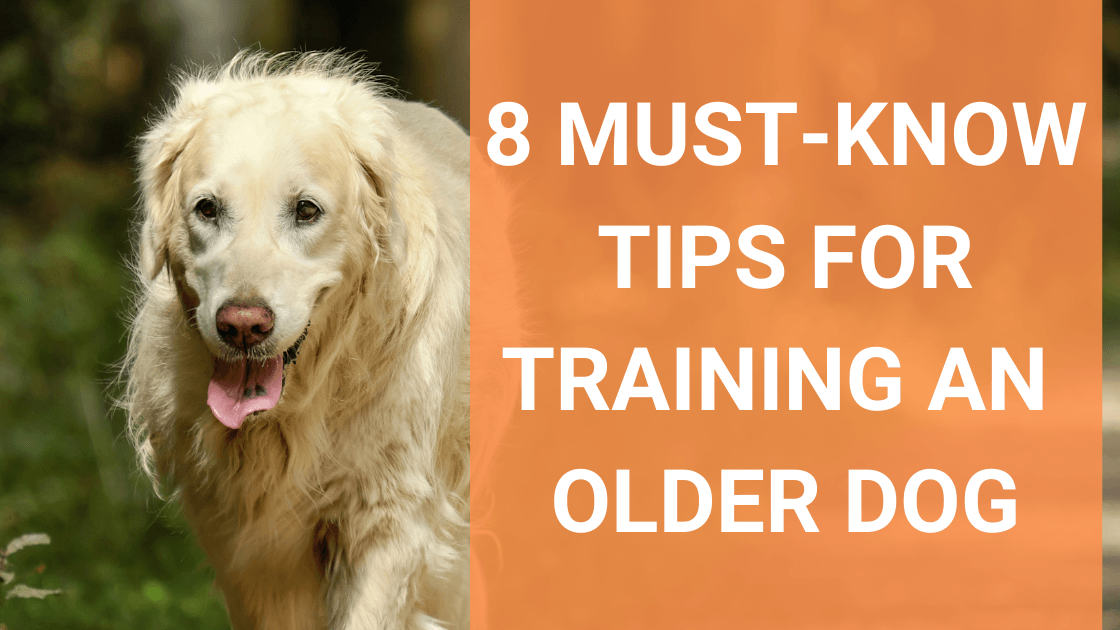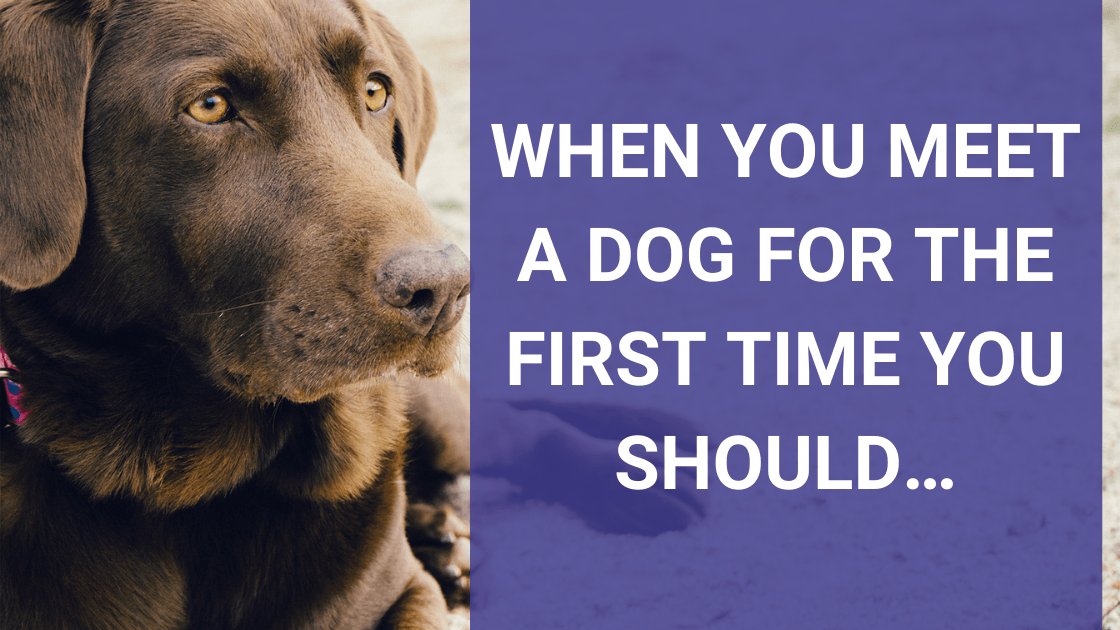Training an older dog has a long standing bad reputation. We’ve all heard the old adage—you can’t teach a dog new tricks. But is it true? In short, no!
Training an older dog is totally doable if you’ve got the right attitude and approach. And that’s good news as more and more families are deciding to adopt or rescue older dogs instead of getting puppy.
So whether you’ve found yourself with a new-to-you older dog that’s in need of some training, or you’re wondering how to approach training with a senior member of your pack these tips are going to help you get the job done.
And remember, you absolutely CAN teach an old dog new tricks. And I’m going help you get it done.
Can you train an older dog?
Training an older dog is totally possible, and in some cases might even be easier than training a puppy. Dogs are lifelong learners, and generally speaking they love to please their owners and receive attention. You can leverage these characteristics to train any dog, no matter their age or training background.
The approach you take to training an older dog will vary slightly based on the dog’s breed (if known), background and training experience. We’re going to get into that more in the tips below. But in short, every single dog is capable of being trained, some just might take a little more time and patience than others.
If you’re new to this whole dog owning thing, and recently adopted or rescued an adult or senior dog, you can find tons of great info in the Monster K9 Field Guide for Large Dog Owners. It’s the complete reference guide you need on all things dog (including more in-depth training tips!).
Benefits to training an older dog
So if you’re not already convinced that training your older dog is totally possible if you go about it the right way, I want to point out some of the benefits to training an older dog.
- It keeps them stimulated mentally. This is just as important as physical stimulation for all dogs, and can be even more important for senior dogs that aren’t as physically capable as they once were
- It’s a great way to bond. Your dog loves spending time with you and getting your undivided attention. Training is a great way to make it happen
- Your dog wants to work. Okay, this isn’t true for every dog. But if you’ve got a large dog, chances are they are a working breed. They want a job and when you do training, you’re giving them one
- It’s safer. If you newly adopted an adult dog or senior dog taking them time to train them is important for your safety and the safety of anyone around your dog
- Dog manners are a thing. No one likes being around a dog that constantly jumps, barks, begs, and pees in the house. So if you’ve adopted an adult dog with no training or manners, training is super important
Alright, now let’s get on with the tips for training an older dog.
1. Figure out what your dog already knows
This tip mostly applies to owners who have newly adopted adult or senior dogs. Before you can begin training, you need to figure out what they already know. Pretty quickly you’ll be able to tell if they have general household manners, and if they respond to common commands like sit, down and paw.
Over the first few days, pay attention to their bathroom habits and any cues they might be using to let you know they need to go outside.
If this is an older dog that you’ve had for it’s whole life, it might still be worthwhile to take an assessment of what they know. So many of us drill in basic command training when we first get our dogs and then it kinda falls by the wayside. My own 5 year old lab knew a lot more tricks at one than he does now.
Take account of what they know and remember, then start training them to do new things from there.
2. Approach training an older dog just like a puppy
If the older dog has recently joined your home and doesn’t seem to have any former training, approach training just like you would a puppy. In fact, the whole process of bringing them home should be a lot like your first day home with your puppy.
Let them have time to get acquainted with their surroundings, and start potty training right away. You should take your dog out regularly and praise them extensively any time they use the bathroom outside to create a connection. If you do see your adult dog go in the house, immediately get them outside. This will all click for your dog quickly if you are consistent!
Beyond house training, you can start working on basic commands right away too using a positive behavior method. You can get detailed info on how to go about this in the Monster K9 Field Guide to Adult Dogs.
3. Utilize a crate when house training an older dog
When you bring a new adult dog home, I highly recommend starting them out in a crate. I’m a firm believer in crate training with puppies, and the same goes for new adult dogs.
For one, you don’t know this dog’s history or how they are going to react to being left alone. By crating them at night, when you are out, or when you can’t give your dog undivided attention (at least in the first few weeks), it’s important that they are in a safe and secure space.
You can read more about this in my article, The Benefits of Crate Training and How to Get it Done.
4. A schedule will make training an older dog easier
This is another tip that mostly applies to adopted or rescued adult or senior dogs. By sticking to a predictable schedule you will have quicker success in your training efforts. Try to take your dog out to use the bathroom at the same times every day and have set meal times.
Additionally, plan exercise times and training sessions at roughly the same time each day. All of this routine and predictability will help concepts click faster for your dog.
5. Training an older dog might be easier
One benefit to training an older dog is that it might actually be easier. Some older dogs might already have strong basic commands and skills that you can build on. They’re often not as hyper, wiggly, or jumpy (even if they aren’t well trained) which can make training sessions less frustrating and more productive all around.
Of course, this isn’t the case with every older dog, but certainly a benefit to keep in mind!
6. Keep your older dog’s past in mind
On the flip side, your dog’s past might get in the way of training or create more challenges. If your dog has a history of abuse or neglect, training sessions might become difficult. Your dog may submit, disengage, or even become aggressive in some instances.
Adopting an older dog often carries this unknown factor. To this day our rescued German Shepherd (who was emaciated when we began fostering him) exhibits food aggression if we feed him even a little after the usual time. He clearly had unpredictable meals and hunger in his past. We’ve made amazing progress with this behavior, but I suspect that a little bit of it will always be in him.
My point here is that we can’t know exactly went down in our dog’s past life, but we can do our best to train them and make them comfortable in their new home. In extreme situations and for more novice dog owners, I highly recommend consulting a professional trainer if you are facing challenging behaviors in your training efforts. They are more equipped to handle behavior issues rooted in past experiences.
Related: Common Dog Behavior Issues and How to Fix Them
7. For well-trained older dogs, up the challenge
If your main goal with training an older dog is to bond with them and stimulate them, that’s awesome! I recommend first brushing up on basic commands and then upping the challenge. Nose work and scent games are a favorite around here, and are a great training and brain challenge for all different breeds.
You can also try getting fancy with fun tricks or tasks around the house. Growing up our dog could get the newspaper, open and close our deck door, and do a great little hands-up then play dead routine. All of those things were taught to him when he was 7+ years old!
A testament to the fact that you can definitely teach your old dog new tricks.
8. Keep it positive
As you work on training your older dog, always remember to keep it positive. Reward and praise are key for keeping it fun and making progress.
Have fun training your older dog!
Now you know that there are a ton of benefits to training an older dog and you’ve got the tips you need to make it a success. Above all, don’t be discouraged! There’s no reason you can’t train your older dog.
If it’s a newly adopted dog, training is important for your dog’s safety and they safety of anyone around it. What’s more, training is a wonderful way to establish trust and build a bond with your new pack member.
Do you have a tip about training adult dogs you’d like to add to the list? Be sure to chime in below! We’d love to keep the conversation going.



